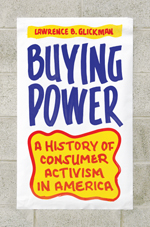The politics of purchasing

Consumerism has long been the target of political activism but as Lawrence B. Glickman demonstrates in his new book Buying Power: A History of Consumer Activism in America it has been used as one of activism’s most effective tools for far longer. In a review appearing in last Friday’s Chicago Tribune, Eric Arnesen praises Gllickman’s book for it’s thoroughly researched demonstration of how Americans have used purchasing power to support causes and punish enemies throughout the Nation’s history. From the Boston Tea Party to the slow food movement Glickman’s book tracks American consumer activism across the centuries to show it as “‘a consistent and long-standing element of American political culture,’ extending back to the 18th Century.” Eric Arnesen writes for the Tribune:
Over the years, a wide range of groups have turned to consumer activism to achieve their ends. Trade unionists engaged in boycotts of anti-labor employers; a half century before the Montgomery bus boycott of 1955-56, Southern African-Americans boycotted segregated transportation systems and, by the 1930s, launched numerous “Don’t Buy Where You Can’t Work” campaigns. Top-down organizations such as Consumers Union and Consumers’ Research offered expert advice in the realm of product testing and consumer education.
The Ku Klux Klan has boycotted Jewish and Catholic merchants; Evangelical Christians have boycotted firms deemed friendly to gays and lesbians, while gays and lesbians have boycotted firms contributing to anti-gay political measures.
Whether under the banner of an explicit consumers’ movement or as members of organizations with other goals, activists across the political spectrum have deployed consumer tactics in an effort to achieve their ends.
Glickman’s Buying Power is a sophisticated and, at times, dense genealogy of politicized consumption. It is also a rich, provocative, and—given the explosion of consumer activist campaigns in recent years—timely study whose insights into the successes, failures and meanings of consumer activism its practitioners would do well to consider.
Read the rest of the article.